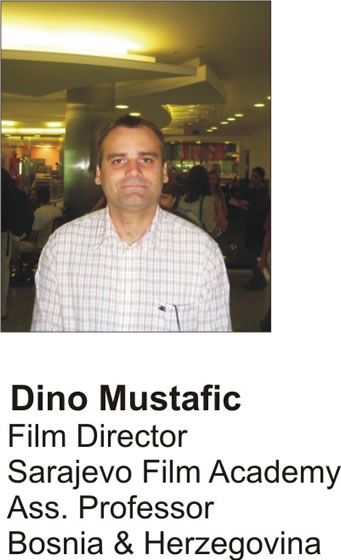Guests
Guest Speaker

Speech
Dear colleagues and quests,
I want to start my speech on this nominated topic, with one recently emitted video record of ritual and brutal killing of six young men from Srebrenica in front of the video camera, which executors probably wanted to have in their home archives as a remembrance on the war and heroic days in Bosnia. Wide public - political and cultural - was shocked and couldn't believe that something like this is possible for people to do to the others. And as much as whole progressive democratic world adjudged this crime - the video record was used as evidence on the court - there are still those who deny the record authenticity and its reliability. That is the reason why it is so hard to believe that a film as a fiction, as an art work who carries a certain idea, can move the borders of reception horizon, and influence a conscience of those who are closed, non-communicative and anti-intellectual towards any spiritual content.
We live in Balkan region, where - I truly believe - a big responsibility is put on an artist and his work, particularly on a film as spiritual content of the world that has to change us cathartically, and to ennoble us intellectually and spiritually. Film is medium that goes into the essence of a subject, into the real nature of events, film is reverse side of reality, film is a spirit of time, film excites us emotionally, film relays a thought, film reflects philosophical nature of an author, film shows reverse side of reality, and finally, film exists as a fictive reality to which we enter as to the real world that works itself and for itself. Every artistic work carries a certain idea. It acts as intensive and expedient as this idea is organically framed in it, so it emerges spontaneously, not imposing as an explicit thesis or political pamphlet.
Unfortunately, during our recent past we were witnesses of social systems and ideologies that have converted film into an intention for expressing through this wide medium, exclusively and only as an ideology of particular nation, class or society. Many of my colleagues participated in these inartistic and unethical works, and particular film environments such as Serbia and Croatia on ex-Yugoslavian region from our recent past, were competing in their films of propagandistic character, which was supposed to explain to the world the correctness of one, and unanswerable guilt of other side. Subjecting a film to actual ideology and political needs is abuse of one of expressive means with wide communicativeness, in my opinion even more than in other areas of artistic expressions, considering film's mass influence. Of course, these films' popularity is short, they are ephemeral and artistically irrelevant, but they leave deep consequences in their environments, separate nations, cultures, deepen misunderstandings, and degrade human spirituality. There are no many films in our region that show the true author's and political courage to face to the complex past, to the phenomenon of repeated crimes that were committed on behalf of collective and ethno-nationalistic ideologies. Therefore, I am here to point out two good films with the war thematic; one of them is No Man's Land from our Oscar-rewarded Bosnian Danis Tanovic, and the other one is Witnesses, made by our colleague Vinko Presan from Croatia, whose projection you will be able to see on this Conference. These films contain living intensity and artistically shaped themes that identify us with the characters and the true author's humanity. Each good author is fulfilled with this humanism that influences the true creating and that is often different from a rational human being of the time and social trend whose price is high for an author himself.
I am afraid that it will take a long time for a film to truly trigger mental processes in these regions, truly start to direct a flow of thoughts towards rebuilding destroyed communicational bridges and progresses that are so necessary for these regions. There are two reasons for my fear: first, the lack of author's courage and honesty to open the tabooed themes of crimes and victims; second, there are more and more audience in cinemas that are not capable to understand philosophic idea of a film, and film as an attitude and opinion, instead of which they go to cinemas to have fun, or passively silence their consciousness with melodramatic stories, or nervous excitement while watching physical actions on the screen. Therefore, I don't think it is possible to develop in young generations a film culture directed toward the deeper meaning of a film and its true sense, during this era of a mass amusement. Sometimes I hear writers say that their book is precious if it found its path to at least one reader; I think that we will, in our near future, be content as film authors if our film finds its path to at least one spectator. I think this is enough for the meaning of our work.
